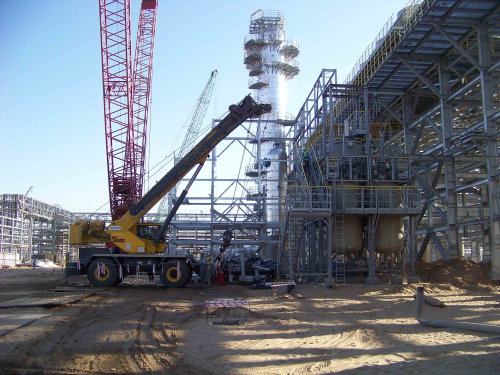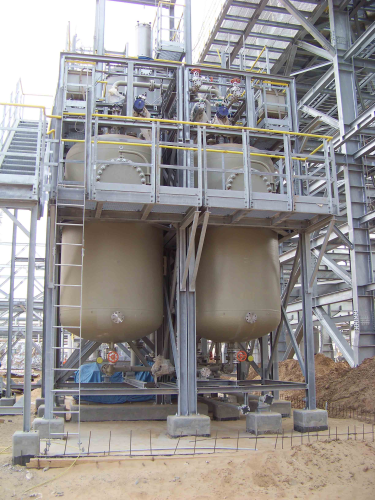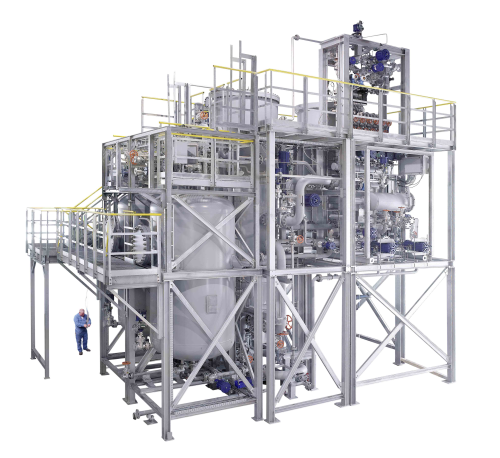



BHS supplied the modular filter plant as part of the crude gas cleaning stage for natural gas production in the South Ýolöten gas field, one of the world's largest natural gas fields in the South East of Turkmenistan. The filter plant is used for cleaning and refining the crude gas in the ‘amine sweetening’ process step.
Featuring a filter area of about 80 m2 each, the candle filters remove impurities such as piping debris from the lean amine. This protects the actual core of the plant – the activated carbon filters – from foreign matter. The candle filters regenerate approximately 150 m3 of lean amine solution per filter unit every hour.
The scope of supply also included the pre-coat station, the activated carbon filter units, a downstream polishing filter, all pumps and fittings as well as the entire measuring and control technology. The plant is integrated into the customer's process control system.
In the amine sweetening process, the sour gas contains impurities such as carbon dioxide (CO2) and hydrogen sulphide (H2S), which are absorbed in an amine scrubber and adsorbed by an activated carbon filter. The amine suspension is clarified by the BHS filter systems. They filter solid particles – piping abrasion and dust, for example – and thus considerably lengthen the life of the amine solution.
The plant was shipped to Turkmenistan in 2011 in fifteen 40-foot containers. BHS adds that the modular construction principle enabled the plant to be erected in a minimum of time.
Candle filters
BHS candle filters are batch-operated filters with vertically arranged, candle-shaped filter elements. They are used for residue filtration, particularly for suspensions with a low solids content or with very fine, amorphous particles that are hard to separate.
The candle filters can be used in a wide range of applications on account of their diverse modification potential. This is primarily in batch operation with dry discharge but also as slurry or wet-discharge filters in quasi-continuous operation.
The filter candles essentially consist of the perforated support grid with evenly spaced welded rods, a textile filter cloth selected to meet the individual requirements, and the internal filtrate discharge pipe. BHS claims that the unique design and the large, open cross-sections of the support grid and discharge pipes ensure good adhesion of the particles during filtration, a high filtrate flow rate and reliable cake discharge by gas blowback or backflushing from the filtrate side.
The candles are mounted on individual collection registers. This allows selected registers to be isolated from the filtration process without interrupting operation. It is also possible for the residue to be removed from specific registers or discharged in portions.
Change of direction
According to BHS, the project demonstrates that the company has successfully accomplished the evolution from a manufacturer of individual filter components to a supplier of complete plants.
For Jürgen Maurer, sales director for the filtration technology division at BHS-Sonthofen, the order represents a milestone in the company's history: “Whereas we previously used to supply mostly individual filter plants, we now additionally offer our customers the entire spectrum of plant construction from design through to commissioning – including the piping and steel structure, for example, as well as the complete process control engineering. We are thus opening up new market segments as we are now addressing a broader range of customers.”
BHS-Sonthofen develops and manufactures machines and plants for mixing, crushing, recycling and filtration applications in the field of mechanical process engineering. The company focuses on customised solutions tailored to the specific requirements of individual industries.
For over 50 years, BHS has manufactured a wide range of filtration plants for solid-liquid separation in batch and continuous processes. A common feature of all BHS filters is that they work with a comparatively thin cake.
The company supplies customers in the construction and building materials, mining, chemicals, pharmaceuticals and food processing industries as well as the environmental and waste management sectors.
BHS-Sonthofen GmbH has been an independent group of companies since 1996. Its history stretches back to an iron-smelting works founded 400 years ago on the site of the present-day company premises. Today, BHS-Sonthofen is a mid-sized global player with over 300 employees, with 210 in Sonthofen. The group of companies is headquartered in Sonthofen, Germany, and has subsidiaries in the US, China and India.





